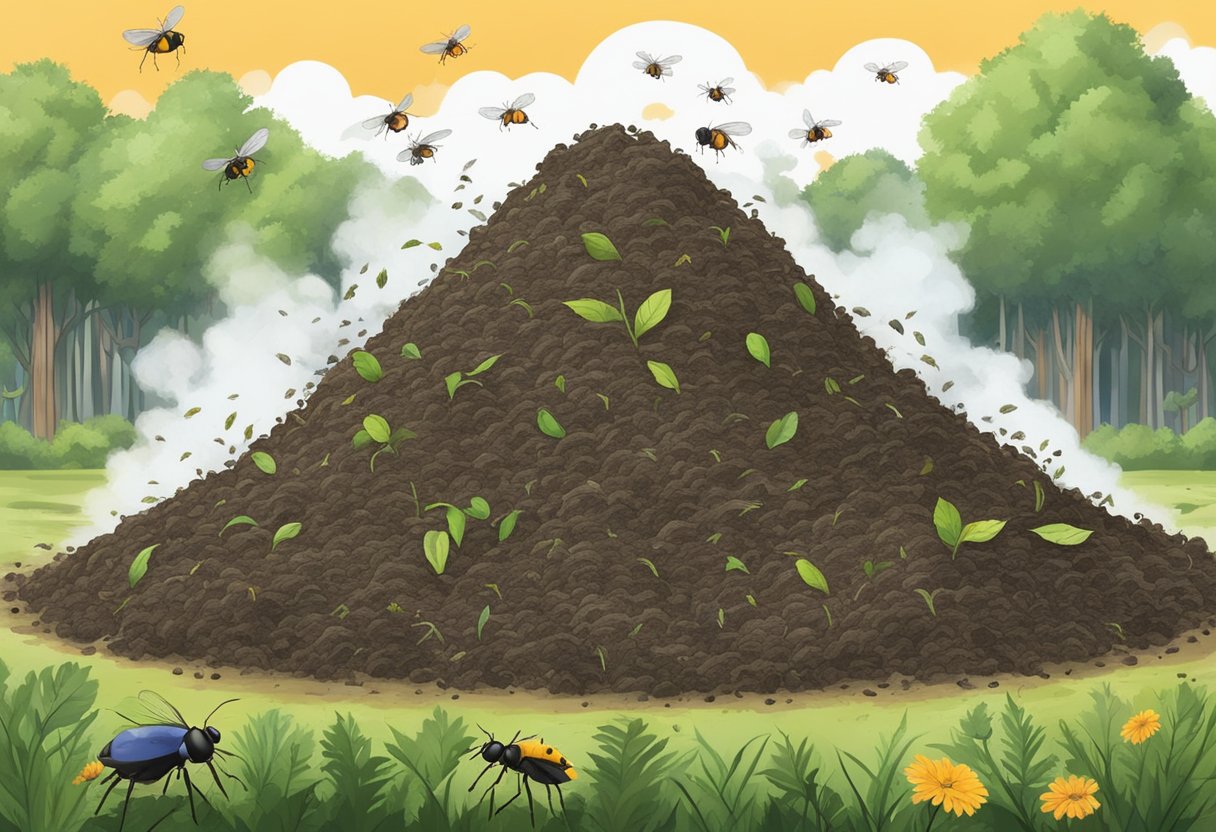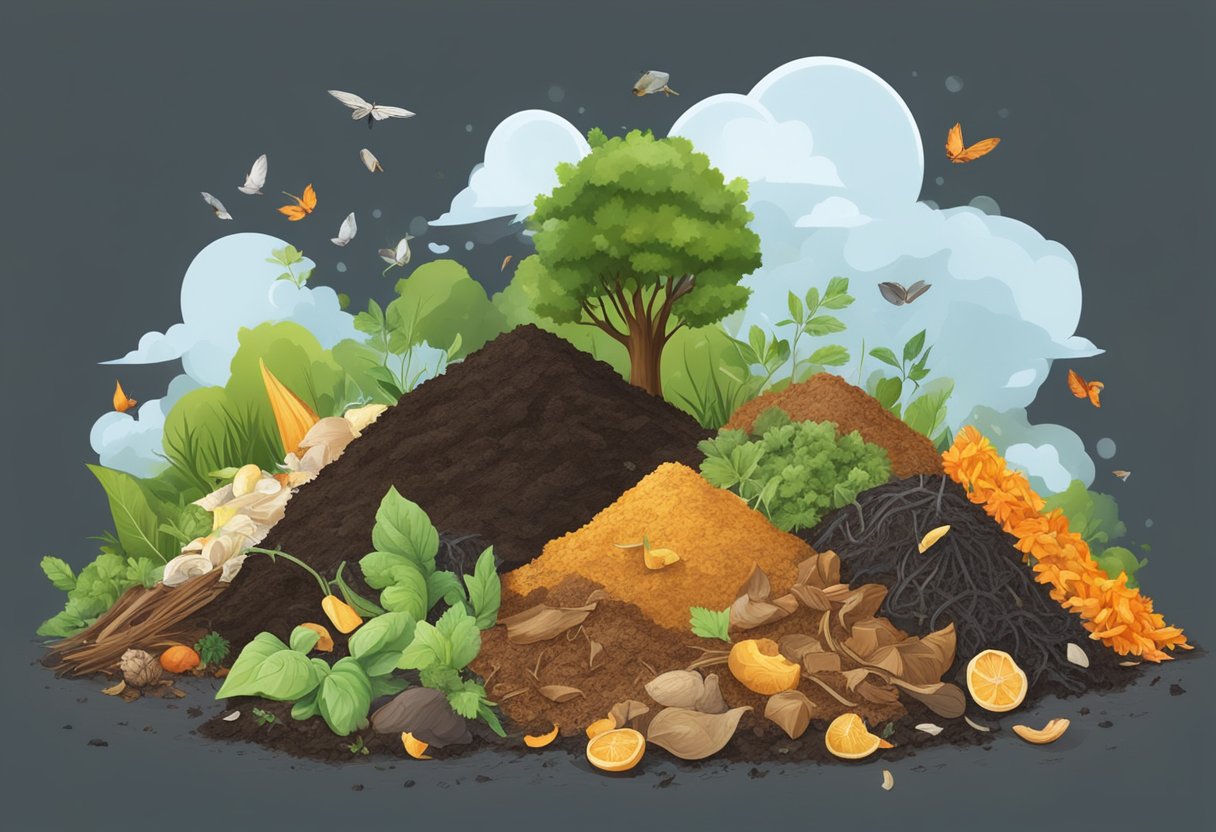As an Amazon Associate I earn from qualifying purchases.
At A Glance
Handling compost improperly or coming into contact with immature compost can potentially pose health risks, although it’s generally safe when managed correctly. Compost piles can harbor bacteria, fungi, or other pathogens, especially if they include diseased plants, meats, or pet wastes. Individuals with weakened immune systems, the elderly, pregnant women, and young children may be more susceptible to infections. It’s advisable to wear gloves, avoid inhaling dust or particles from the compost, and wash hands thoroughly after handling compost to minimize risks.
Composting is a popular way to reduce waste and create nutrient-rich soil for gardening. However, some people may wonder if handling compost can make them sick. The answer is yes, compost can make you sick. There are a variety of harmful microorganisms in a compost heap that can cause illness.

Some of the diseases you can get from handling compost include Legionnaires’ disease, which is a form of pneumonia caused by Legionella bacteria. Inhaling or ingesting compost may raise the risk of Legionnaires’ disease. Additionally, compost can also harbor other harmful bacteria, such as salmonella, aspergillosis, and tetanus. Fungal infections like farmer’s lung and histoplasmosis are also possible if you inhale dust from moldy compost. While the risk of getting sick from compost is relatively low, it is still important to take precautions to protect your health.
Understanding Composting
Composting is the process of decomposing organic materials such as food waste, leaves, and grass clippings into a nutrient-rich soil amendment. This process is achieved through the activity of microorganisms, such as bacteria and fungi, that break down the organic matter.
Compost is made up of two types of materials: browns and greens. Browns are materials that are high in carbon, such as dry leaves, sawdust, and shredded paper, while greens are materials that are high in nitrogen, such as grass clippings, vegetable scraps, and coffee grounds. To make good compost, you need a balance of both browns and greens.
In addition to carbon and nitrogen, composting also requires oxygen and water. The microorganisms that break down the organic matter need oxygen to survive, and water is necessary to keep the compost pile moist. A good compost pile should be kept moist but not too wet, and it should be turned regularly to ensure that oxygen is distributed throughout the pile.
There are many different ways to compost, including using a compost pile or a compost bin. Home composting is a great way to reduce waste and create nutrient-rich soil for your garden. However, it’s important to follow some basic safety guidelines to avoid getting sick from handling compost.
For example, it’s important to wear gloves when handling compost to protect your hands from cuts and scratches. If you have an open cut or wound, tetanus bacteria can easily spread from your compost pile to your body, making you sick. You are particularly at risk if you regularly handle thorny plants, manure, and soil. So the more up-to-date you are with your tetanus shots the better.
Overall, composting is a safe and effective way to reduce waste and create nutrient-rich soil for your garden. By understanding the basics of composting and following some basic safety guidelines, you can enjoy the benefits of composting without putting your health at risk.
Compost Ingredients and Their Risks
Composting is a great way to recycle organic waste and turn it into nutrient-rich soil for your garden. However, not all materials are safe for composting, and some can even make you sick. In this section, I will discuss the different types of compost ingredients and their risks.
Safe Materials for Composting
The following materials are safe for composting:
- Grass clippings
- Fruits and vegetables
- Coffee grounds
- Leaves
- Sawdust
- Wood chips
- Hay and straw
- Eggshells
- Nutshells
- Paper and cardboard
These materials are rich in nitrogen and carbon, which are essential for the composting process. They are also free of harmful pathogens and chemicals.
Risky Materials for Composting
The following materials are risky for composting:
- Meat, dairy, and fish
- Bones
- Oils and fats
- Cooked food
- Dairy products
- Pet waste
- Bread
These materials can attract pests and rodents, and they can also produce foul odors. They also contain high levels of nitrogen, which can disrupt the balance of the compost pile and slow down the composting process.
Hazardous Materials for Composting
The following materials are hazardous for composting:
- Pesticides and herbicides
- Charcoal ash
- Diseased plants
- Weeds with seeds
- Synthetic chemicals
These materials can contaminate the compost pile and harm the beneficial microorganisms that break down the organic matter. They can also release harmful toxins into the soil and harm your plants.
In conclusion, composting is a safe and effective way to recycle organic waste, as long as you use the right materials. Stick to safe materials like grass clippings, fruits and vegetables, and coffee grounds, and avoid risky and hazardous materials like meat, dairy, and pet waste. By doing so, you can create nutrient-rich soil for your garden and reduce your carbon footprint.
Health Risks Associated with Composting

Composting is a great way to recycle organic waste, reduce methane emissions from landfills, and create nutrient-rich soil for gardening. However, it is important to be aware of the potential health risks associated with composting. In this section, we will discuss some of the health risks associated with composting and how to protect yourself.
Bacterial and Fungal Infections
Compost can contain harmful bacteria and fungi that can cause infections in humans. These include Salmonella, E. coli, Legionella longbeachae, Aspergillus, and other pathogens. People who are elderly, smokers, or have chronic lung diseases are more susceptible to these infections. To reduce the risk of infection, it is important to wear gloves when handling compost, especially if you have cuts or abrasions on your hands. You should also avoid touching your face or mouth while handling compost and wash your hands thoroughly with soap and water after handling it.
Inhalation Hazards
Composting can also pose inhalation hazards. When compost is disturbed, it can release bioaerosols, which are tiny water droplets that contain fungal spores, bacteria, and other particles. Inhaling these particles can cause respiratory problems, including asthma and pneumonia. To protect yourself from inhalation hazards, it is recommended to wear a dust mask or respirator when handling compost. You should also avoid working in windy conditions, as this can increase the amount of bioaerosols in the air.
Physical Injuries
Composting can also pose physical injury risks. For example, thorny plants can cause cuts and abrasions, and fingernails can easily become infected if they are not properly cleaned. Tetanus is a dangerous bacteria that is common in soil, and infections can easily occur through a cut on your hand. Therefore, it is wise to protect yourself when handling compost by wearing gloves and ensuring that any open wounds are covered.
In summary, composting can be a safe and productive exercise despite the potential dangers, providing that you follow a few safety protocols. Wear gloves and a dust mask or respirator when handling compost, avoid touching your face or mouth, and wash your hands thoroughly with soap and water after handling it. By taking these precautions, you can reduce the risk of infection, inhalation hazards, and physical injuries associated with composting.
Prevention and Safety Measures
Proper Composting Techniques
To minimize the risk of getting sick from handling compost, it’s important to follow proper composting techniques. This includes maintaining the right temperature and moisture levels, as well as turning the compost regularly to ensure that it is properly aerated. Knowledge of the right mix of carbon and nitrogen materials is also important to ensure that the compost is properly balanced.
Hot composting is one method that can help reduce the risk of harmful microorganisms. This method involves maintaining a temperature of at least 130°F for several days, which can kill off many of the harmful bacteria and fungi that may be present in the compost.
Protective Gear and Hygiene
When handling compost, it’s important to wear protective gear such as gloves and a dust mask to minimize the risk of exposure to harmful microorganisms. It’s also important to practice good hygiene by washing your hands thoroughly after handling compost.
Proper Handling and Use of Compost
To minimize the risk of getting sick from compost, it’s important to handle and use it properly. This includes dampening down the compost to minimize the risk of dust particles becoming airborne, and using masks when necessary. It’s also important to use compost products as directed, and to avoid using compost as a fertilizer or soil amendment until it has been properly processed.
By following these simple safety precautions, you can minimize the risk of getting sick from handling compost and enjoy the many benefits of this valuable soil amendment.
Composting and the Environment
Composting is a natural process that involves the decomposition of organic materials by microorganisms. This process is beneficial for the environment in many ways. In this section, I will discuss the benefits of composting as well as the potential environmental hazards associated with it.
Benefits of Composting
Composting is an effective way to reduce organic waste and divert it from landfills. When organic waste is sent to landfills, it decomposes anaerobically and produces methane gas, which is a potent greenhouse gas. By composting organic waste, we can reduce the amount of methane produced and help mitigate climate change.
Composting also helps to enrich soil by adding nutrients and improving its structure. Compost contains many essential nutrients that are beneficial for plant growth, including nitrogen, phosphorus, and potassium. It also helps to retain moisture in the soil, reducing the need for irrigation.
Potential Environmental Hazards
While composting is generally safe, there are some potential environmental hazards associated with it. For example, compost piles can attract pests such as rodents and fruit flies. To prevent this, it is important to keep the compost pile covered and avoid adding meat, dairy, or oily foods to the pile.
Another potential hazard is the spread of weed seeds. If the compost is not heated to a high enough temperature, weed seeds may survive the composting process and germinate when the compost is used in the garden. To prevent this, it is important to maintain a high temperature in the compost pile and avoid adding weed seeds to the pile.
Commercial compost may also contain pathogens, such as spores and bacteria, that can be harmful to humans and animals. To prevent this, it is important to purchase compost from a reputable source and avoid using manure from animals that have been treated with antibiotics.
Finally, composting can sometimes produce unpleasant odors that can be a nuisance to neighbors. To prevent this, it is important to maintain a proper balance of organic materials and avoid adding too much of any one type of material, such as manure or food waste.
Overall, composting is a safe and effective way to reduce organic waste and improve soil health. By following proper composting practices, we can minimize the potential environmental hazards and enjoy the many benefits of composting.
